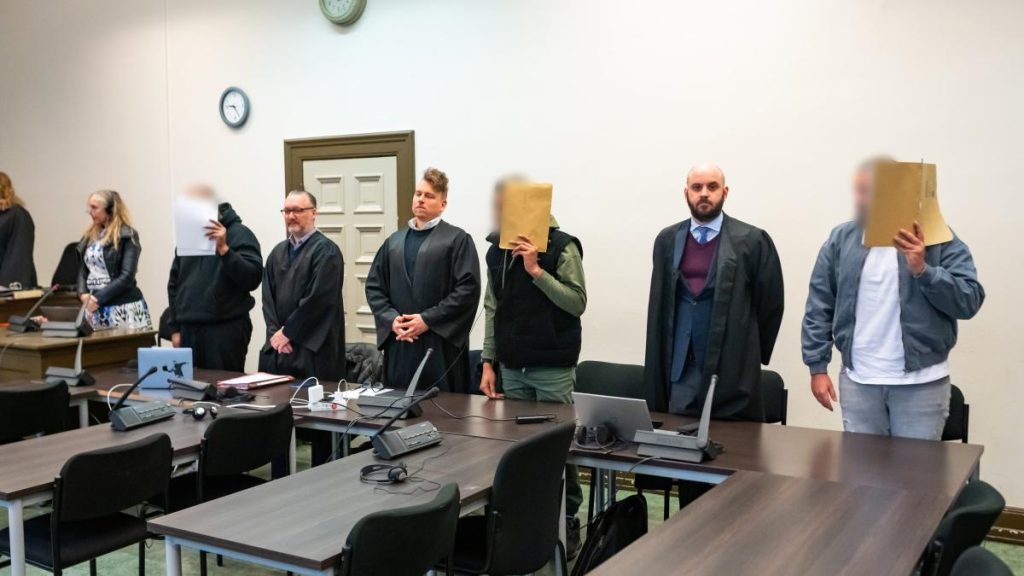During the trial, as the prosecutor reads out new charges, the translator struggles to keep up with translating the German legal paragraphs and facts into meaningful English sentences. Seated on the defendant’s bench to her left are two men from the Bahamas who seem somewhat shocked to find themselves in the plain courtroom 388 of the Hamburg District Court. The proceedings, which began last Friday, highlight how global the modern cocaine trade operates, how hard law enforcement agencies have to work to achieve successful investigations, and the arsenal of weapons that gangs now possess.
The two men from the Bahamas, Marlon J. and Tad M., are part of an internationally operating drug group and are facing charges of drug trafficking in significant quantities, attempted deprivation of liberty in a group, and a crime under the Arms Act. According to the prosecution, Marlon J. traveled to Germany in early July 2023 and settled in Hamburg. Along with the port of Rotterdam in the Netherlands, the largest in Europe, and the port of Antwerp in Belgium, the port of Hamburg is one of the three major entry points for cocaine shipments from South America. The accused obtained so-called bunker apartments where kilos of cocaine and marijuana were stored, distributing the drugs to couriers from there. The gangs now communicate through chat groups, some better protected from investigators’ prying eyes than others. Marlon J. went by the name “Ghost” in a Signal chat group. However, investigators quickly caught on to him and monitored him for the next few months.
One name mentioned in the indictment raises eyebrows: Mansour Ismail, a cocaine godfather on the run who is currently one of Europe’s most wanted criminals. Ismail fled from Hamburg to Spain in 2020 and has been missing since. Police publicly seek him with a photo and consider him the mastermind behind several drug-related murders. The case was featured on the ZDF program “Aktenzeichen XY … ungelöst,” where one of the murders in a Hamburg shisha bar was discussed this week. Ismail still appears to be pulling the strings from afar, surprisingly involved in daily operations for a drug boss in exile.
The prosecutor recounts an incident on July 25, 2023, where Marlon J., in one of the drug hideouts, received a message from Mansour Ismail instructing him that a courier would come to pick up 25 packets of a kilogram of marijuana each, using the codeword “Paris.” The business was booming, and in September 2023, the man from the Bahamas received support from home. According to the indictment, Tad M. traveled to Germany to also sell drugs in Hamburg and its surroundings. He received at least 10,000 euros from the “organization” for this. Despite the seizure of over 30 tons of cocaine nationwide in the past year, the availability of drugs in clubs, bars, and streets in Germany has not been significantly affected, showing the volume of narcotics undetected entering the country.
Marlon J. received another assignment from his cousin, believed to be another member of the group, in November 2023: to forcibly abduct and threaten a man named H. with a weapon from a bar in the Hamburg district of Eimsbüttel. The exact relationship between the later victim and the cocaine cartel is not clear on this day in court. The man from the Bahamas met with another accomplice who efficiently and rapidly acquired heavy weapons. Marlon J. bought ten 9mm submachine guns, five magazines, and a total of 760 rounds. He sold one, earning 5000 euros. He then informed his countryman and a Turkish-rooted Hamburger accused in the trial of the plan. The potential victim was lured out of the bar by one of the men from the Bahamas and the Hamburger, both masked and armed, but the victim managed to escape back into the bar and lock the door from inside.
The three defendants remain silent in court, letting their lawyers explain that they do not wish to make any statements about the case or themselves. The trial continues, with hearings scheduled until mid-June. The case sheds light on the ease with which criminals obtain heavy firearms today and the challenges that law enforcement faces in combating international drug trafficking networks.


